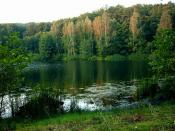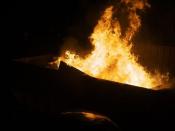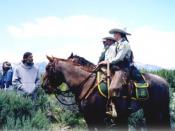It is six o'clock at night when a forest ranger gets a call informing him or her that a fire has broken out in the forest. Should the ranger call the fire department to come extinguish the fire immediately, or should the ranger allow the fire to burn itself out? This question has been the topic of conversation for many years. However, during the years of 2001 and 2003, this question had become much more publicized due to the catastrophic fires that broke out across the United States. The answer to this question has been debated many times. Should nature be allowed to take its course? I believe that nature should be allowed to proceed without any interruption and fire is a part of nature.
Fire has been an essential part of forested ecosystems for centuries. Fire recycles forest nutrients, deters unwanted noxious weeds, thins out thickets of trees, and rejuvenates forests.
Fires creates plant and animal habitats and encourages the growth of native plants. Fire was the forest management tool foe Native Americans for thousands of years. "Native Americans used fire in virgin pine stands to provide better access, improve hunting, and to rid the land of undesirable species" (Nix). Wild-land fire causes change and change has its own value.
"Change is biologically necessary to maintain many healthy ecosystems" (Nix). Frequent burning keeps wildlife and the forests they live in healthy and sustainable. Although foresters and ecologists know that removing fire from forests devastates long-term forest health, firefighters still extinguish almost all fires. The United States Forest Service and the United States Congress have been working together to find a way to carefully restore fire to forested areas. However, environmental groups are trying to keep fire out of all forests.
In 2002, President Bush launched the Healthy Forest Initiative...



Good essay.
This is a well-researched essay. However, I don't feel it's quite to College Soph level.
5 out of 5 people found this comment useful.